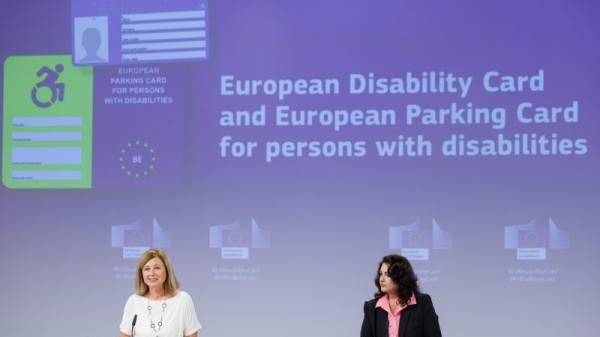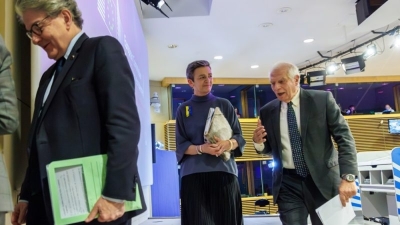EU Disability Card goes some way to improving accessibility across the bloc

While broadly welcomed for harmonising accessibility measures across the bloc, the agreement on the EU’s first bloc-wide Disability Card is only a first step in securing true freedom of movement within EU countries for people with disabilities, an expert told Euractiv.
Around 87 million people in Europe live with some form of disability. As member states currently recognise these disabilities according to varied criteria, with corresponding national disability cards, thousands of people regularly encounter barriers when travelling or visiting another member state due to the lack of homogeneous recognition.
In efforts to streamline the system, EU institutions agreed on 8 February to an EU-wide disability card which aims to facilitate access to the right to free movement for persons with disabilities.
It will ensure that individuals visiting other member states have the same accessibility measures as those residing in those states.

EU Parliament endorses new bloc-wide Disability Card
EU lawmakers agreed on Thursday (11 January) on their position for the first EU-wide Disability Card that aims to guarantee a minimum standard of support for persons with disabilities across Europe.
Free movement for all
“Persons with disabilities have been eagerly awaiting this legislation. The significance of the European Disability Card extends beyond simply facilitating travel; it embodies the EU’s commitment to ensuring free movement for all Europeans,” said liberal MEP Lucia Ďuriš, rapporteur of the file in the Parliament.
Alejandro Moledo, deputy director and head of policy at the European Disability Forum (EDF), agreed.
“It doesn’t only have a practical value, especially for people with invisible disabilities, […] but a symbolic one as the ‘European project’ of feeling part of the European Union,” he told Euractiv.
“The important thing is that we will have the card and that it is the first step, let’s say, to add rights,” Moledo explained.
EDF welcomed the agreement and the Commission’s first proposal as they value the “change of logic” away from accessibility measures as an ‘add-on’ or optional extra.
“All service providers, including transport, are included and have to recognise the same treatment or the same discounts for a national with a disability as for a European with a European disability card,” said Moledo.

EU disability card proposal welcomed but disability organisations want more
The European Commission has proposed the European Disability Card as an EU-wide cross-border proof of disability. While welcomed, the proposal was also criticised as insufficient by disability organisations, which now urge co-legislators to take action, particularly on work and study matters.
Just a first step
As the card in its current form is designed for short-term trips, Moledo explained that the next step is to facilitate movement for longer periods such as study or work.
“The next thing is that the Commission will really look at what are the barriers to free movement for people with disabilities, including when we move to study or work in another member state, which is where the problems are,” he explained.
He talked about his own personal experience when he moved to Belgium from Spain.
“In Spain, my disability was already recognised and I was benefitting from the so-called “reasonable accommodation” in my job. I was working in an office, I needed a bigger screen and they gave it to me,” he said.
When he moved to Brussels he had to undergo a re-evaluation of this disability for it to be recognised in Belgium and be able to receive the same benefits he had in Spain. This process took up to a year, a time when he lost the aids he already had.
While the disability itself doesn’t change, when you move, the recognition of your condition currently does, Moledo said.
The new card will make this process easier by recognising the disability status from the moment someone arrives in the country.
While welcoming the inclusion of the Erasmus program and the Solidarity Corps in the agreement, the EDF said it regrets that temporary access to disability support and allowance when persons with disabilities move to work and study abroad was not included.
This is something that the European Parliament also considered in the file, demanding interim solutions for people with disabilities who spend more than three months at a time in another EU country and ask for social benefits.
The text is expected to be endorsed by the Parliament in April after which it will enter into force. The implementation timeline agreed upon by the EU co-legislators is 30 months to transpose the legislation and a year extra to issue the first card, meaning that persons with disabilities will start benefiting from it almost four years from now.
Read more with Euractiv




